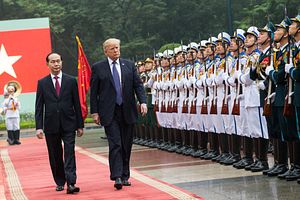The death of Vietnam’s president last month has not only put the focus on his legacy, but also raised wider questions about the role of the presidency and what it means for politics more generally in the one-party, communist Southeast Asian state.
Last month, Vietnam was gripped by the death of communist hardliner Tran Dai Quang after a long battle with cancer. Quang is justifiably being mourned for a long political career marked by a range of positions across issues, including his recent stand against corruption and the support he lent to anti-Chinese protesters angered over plans to extend 99-year leases to Beijing in special economic zones.
A former minister for public security, Quang only served part of his term as president, entering the job at the same time as Nguyen Phu Trong began his second term as Party Secretary General. His legacy will partly be remembered in terms of the wider political developments in Vietnam over the past few years.
Carl Thayer, emeritus professor at the University of New South Wales, said Trong was determined to reassert collective party leadership over Vietnam’s political system in the aftermath Prime Minister Nguyen Tan Dung’s decade-long “free-wheeling” rule.
Dung’s leadership was marked by high level corruption and spectacular corporate losses and collapses that are being felt to this day amid a weeding-out of officials tied that era, labelled by some as a witch hunt.
“Quang supported Trong’s anti-corruption campaign, even including corrupt officials in his former Ministry of Public Security that he headed before his elevation to state president,” Thayer wrote, taking steps “to cut its top heavy structure where too many generals enjoyed perks and had too little to do.”
He added that since then officials from the Public Security Ministry had been charged with corruption, dereliction of duty and abuses against prisoners with its power curtailed in a drive to make it more accountable.
“These decisions were made while Quang was a member of the Politburo. The basic function of the Ministry of Public Security will not change but it will now be subject to greater scrutiny by senior party officials,” Thayer said.
It’s a positive legacy for someone whose past was as orthodox as it was long. He spent 45 years in the public security ministry, the last five as chief.
As head of security, Quang also oversaw brutal crackdowns on human rights activists, journalists, bloggers and dissenting voices that have grown tired of a state apparatus that administers a zero-tolerance policy to anything deemed a threat to national security.
But he did hold a sympathetic ear for protestors upset by a draft law announced in May, which would open up investment for Chinese firms seeking 99-year leases in selected special economic zones in Vietnam.
That led to protests in June, testing the patience of a party divided between traditionalists and those seeking to open-up Vietnam’s economy to investment, including China, which has faced a wave of criticism for its investment strategy that includes massive loans to countries that can ill-afford to repay.
“Quang’s stance would have been popular in Vietnam,” Thayer added.
Quang’s death has also raised questions for the future of the presidency and politics in Vietnam. Immediately after his death, Vietnam subsequently appointed its first female president, Dang Thi Ngoc Trinh, who was elevated from the vice-presidency as expected.
Her appointment itself is not without consequence. Aged 61, she was first elected vice president in January 2016 and has now become the first female head of state in a communist country since East Germany’s Sabine Bergman-Pohl, who led during reunification with West Germany. She is set to serve as acting head of state until the National Assembly elects a new leader.
Nonetheless, her role is one of acting president. In that capacity, she is not expected to veer from Quang’s conservative attitudes and his absolute support for Vietnam’s one-party state, even if her temporary designation to the role may be of significance. In addition, as others have observed, the level of representation of women in Vietnam’s politics is still an area where the country can improve upon as well.
Beyond that immediate focus, though, the attention has also turned to the future of the presidency in Vietnam as well. In particular, there have been suggestions that Trong, the communist party chief, could double up as president, in what would constitute a further consolidation of his power.
Of course, this itself comes as no surprise. Quang passing was always going to result in a wider leadership reshuffle of sorts. Any changes are unlikely to lead to any turbulence within the Politburo or the relationship between government and the Communist Party, which is usually carefully calibrated over time.
Nonetheless, as developments unfold, it will be interesting to see what Quang’s death may constitute for the presidency in Vietnam as well as the broader political balance of power among various actors therein, which could affect the evolution of domestic and foreign policy as well.
Luke Hunt can be followed on Twitter @lukeanthonyhunt

































